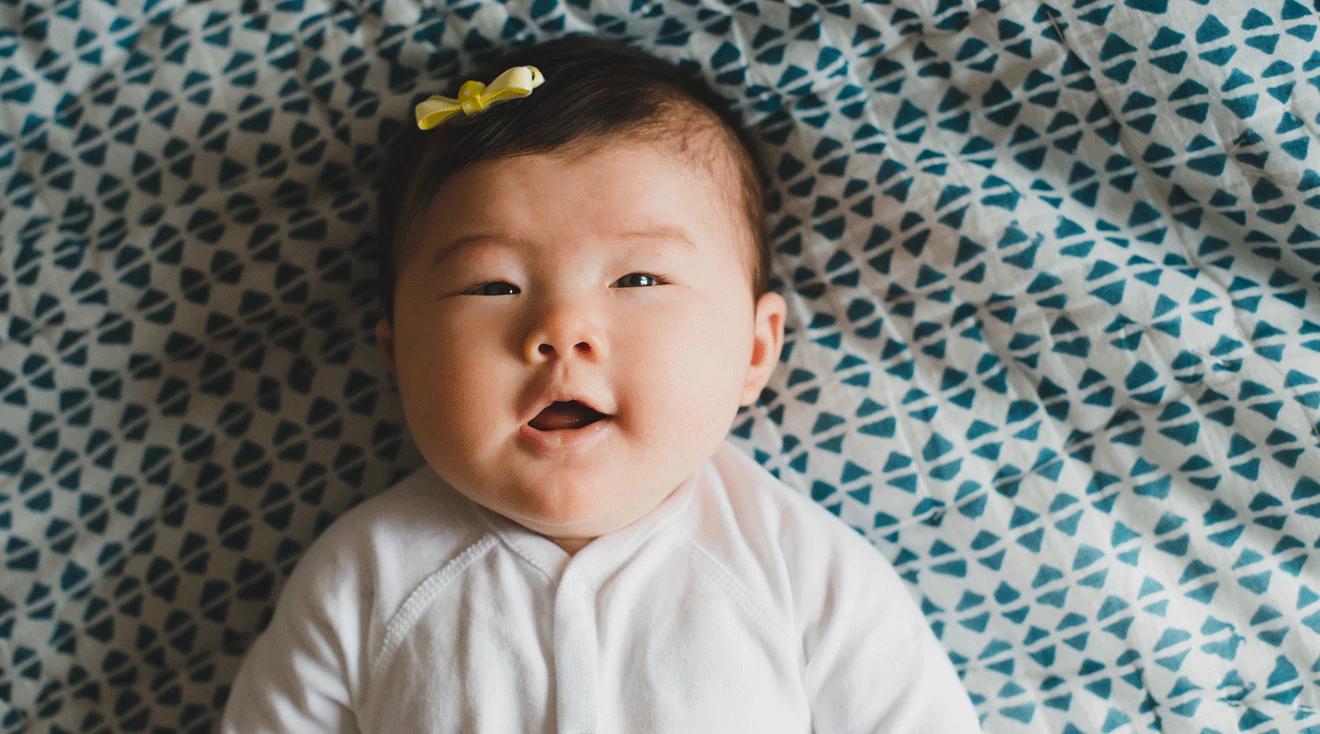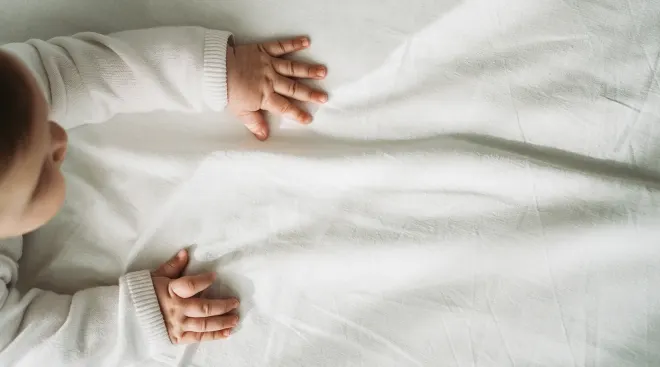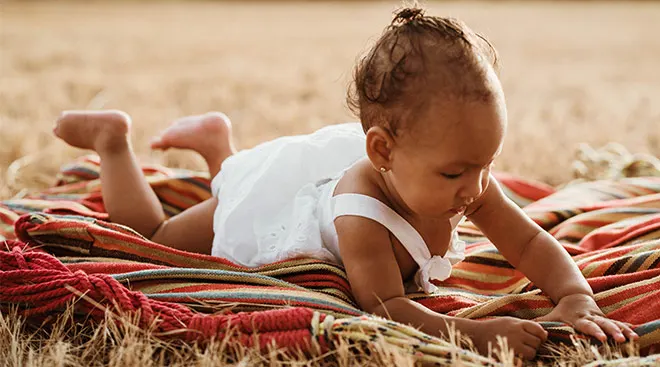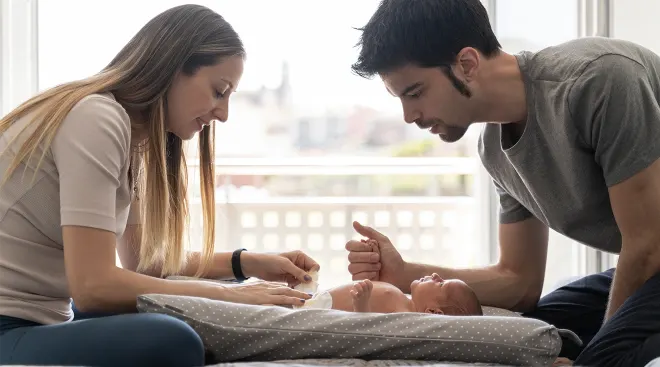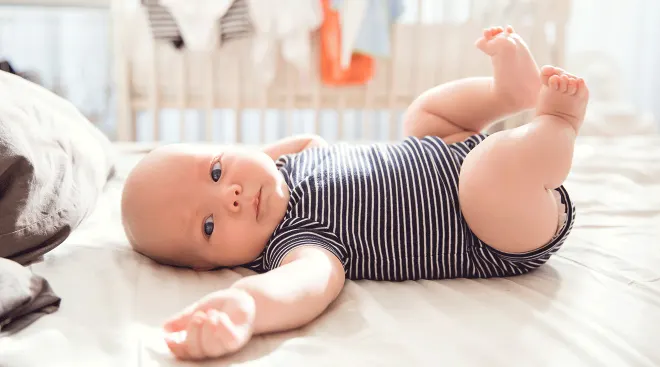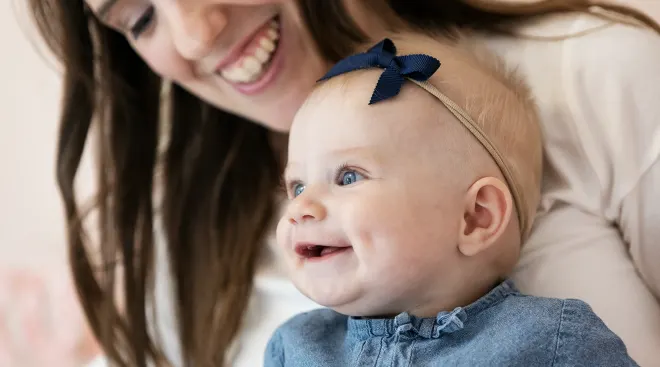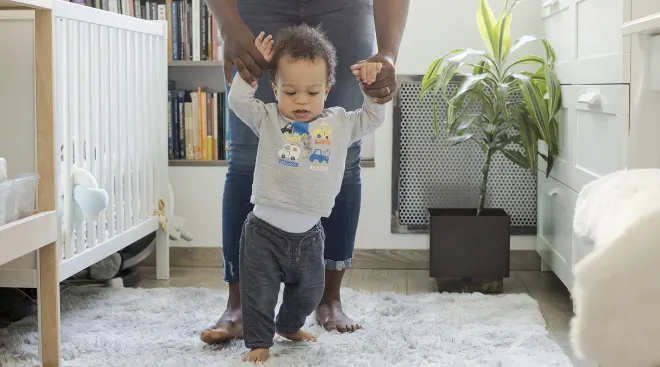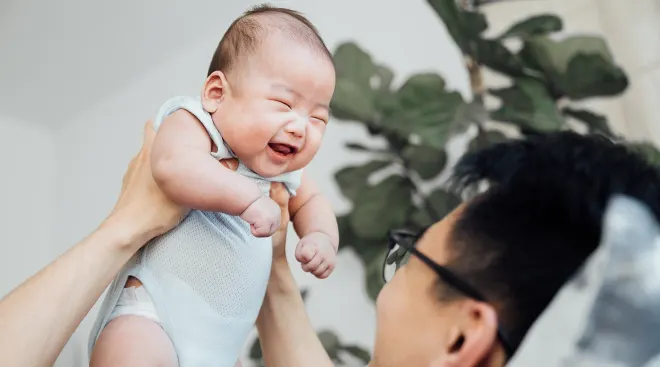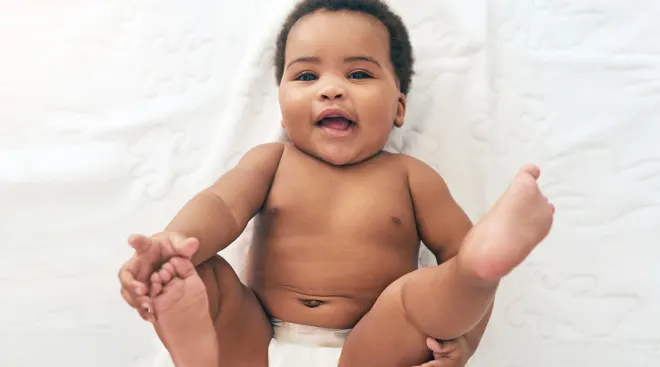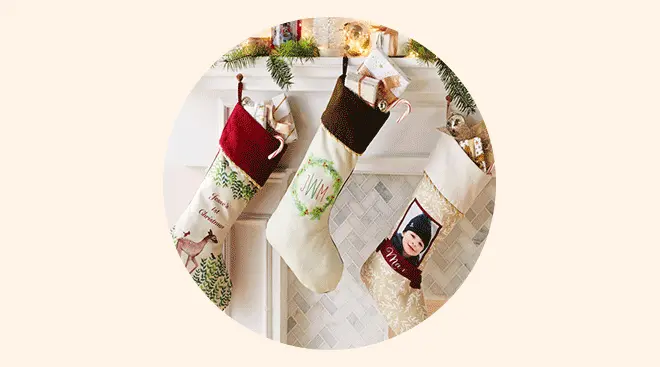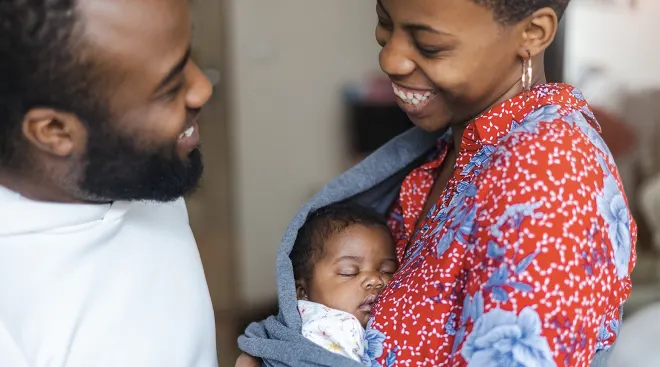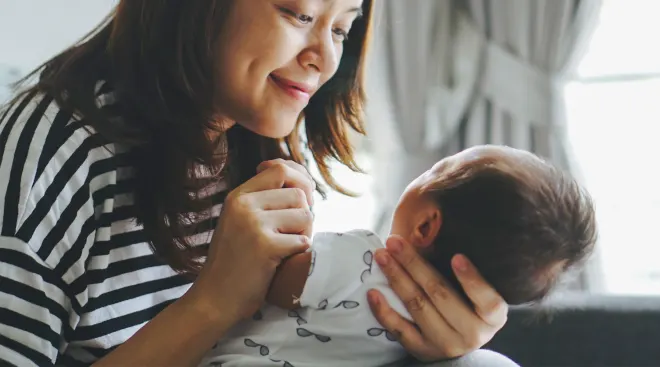When Do Babies Start Talking?
A common question among first time parents: When do babies start talking? Believe it or not, baby’s journey to two-way communication begins earlier than you might think. Here’s further proof that babies are pretty incredible: They start learning language even before birth! That’s because baby could hear you speaking while in the womb and got familiar with the rhythm and sounds of the language you spoke. In fact, studies show that babies whose moms read specific books to them while pregnant go on to prefer hearing those books once they’re born, as measured by an increase in their sucking motion.
But exactly when do babies start talking—or saying actual words? The baby-talking milestone is a particularly exciting one. Few things are as special as watching baby start to babble, form words and eventually string those words together into sentences. Of course, every baby’s speech path is different, but there are some common signals and stages to look for during their language development. What’s more, there are ways to encourage baby to start creating associations and forming words.
Ready to get the language low-down? When do babies start babbling? At what age do babies start talking? And what words might you hear first? Follow along to find out what you can expect and what to do if baby isn’t hitting certain milestones.
Before learning to talk, babies begin babbling. It might sound like gibberish, but this is the foundation of verbal communication. Yes, it’s baby’s first attempt at speaking a language. Babbling is like baby’s training wheels, as it gets them ready for the real deal. “It’s all practice, because those babbles form the basis of their first words,” according to Marianella Casasola, PhD, who researches babies in her Infant Studies Laboratory at Cornell University. Babbling often includes sighing and cooing sounds, which eventually develop into consonant sounds.
For example, baby might start making the “m” sound. With plenty of practice, that sound may turn into “ma,” and before you know it: “ma-ma.” So when do babies start babbling? Many babies will be babbling by the six-month mark, and begin using multiple syllables around 9 months old. Here’s a closer look:
By 6 months
As mentioned above, most babies are babbling regularly by 6 months, making short strings of consonant-vowel sounds such as ba-ba, ma-ma and da-da. “Babies exposed to two languages will even babble in ways that are consistent with both languages,” says Casasola.
At this stage, baby is rapidly acquiring receptive language, meaning language that they can understand, even though they can’t yet speak it. Experimental studies show that babies can associate “mama” with their caregiver, as early as 6 months.
By 9 months
By about this age, babies can begin to string sounds together to form multiple syllables, such as “ba-da-ma.” Babies can understand a lot more language than they can produce at this stage—largely because infants don’t have the motor skills to form words with their mouths yet, Casasola explains, and because it takes more cognitive skill to be able to pull a specific word from their memory than it does to just understand it.
Apart from babbling around 6 months of age, when babies start to play with language sounds, they won’t say their official first words until they’re around one. (Of course, they have their own ways of communicating with you from birth—by crying, gurgling, sighing, cooing and, starting around 2 months, smiling.)
So when do babies say their first word? Well, there isn’t an exact answer. “There is a range when babies say their first words,” says Jocelyn Wood, CCC-SLP, a speech language pathologist. “In general, babies will say their first words between 9 and 12 months of age.” And when should a baby start talking more regularly? While that can also vary from baby to baby, it’s helpful to have an idea of what to expect. Below, you’ll find a general timeline for when babies say their first word, when babies start talking in full sentences and when babies talk clearly.
By 12 months
Get ready for your heart to melt to the sounds of “mama” and “dada.” Babies say their first word around 12 months, and will talk more clearly and have more words by about 18 months. “First words are going to be the things that are most common in your child’s world,” Wood says, “such as food items (banana, apple, milk), toys (ball, baby, car), important people (Mama, Dada, a pet or sibling name) or words from familiar routines (more, mine or all done).”
By 24 months
“Eighteen- to 24-month-old toddlers go through a period of rapid growth, when they are learning new word(s) every day,” Wood says. At this point your budding linguist may have a vocabulary of 50 to 100 words. “The 100 word milestone is important because this is when toddlers really start combining words to make simple phrases,” she explains. These sentences start as two- or three-word sentences (e.g., “my toy!”) and slowly but surely become more complex.“ Although there may be some slight variability, by 24 months you should be starting to lose track of the number of words they have and be focusing more on different combinations of words,” Wood says.
By 36 months
By 36 months, your toddler is likely to have a vocabulary of 200 words or more, though you probably won’t be counting anymore. Many kids this age can string together sentences of three or four words. You’ll also notice that your toddler speaks more clearly now; you should be able to understand at least 75 percent of what your little one says, which can also help reduce the number of tantrums (hurray!).
They’ll also be able to understand a lot of what you’re saying, so expect to get reactions from your little listener. You’ll notice your child may start to use language to solve problems and explain concepts around this age. Last but not least, get ready for storytime—your toddler will likely be telling you a few good tales pretty soon.
“Babies are hardwired to learn language” in order to get what they need and connect with you, Casasola says. “The key is to interact and have fun, because every interaction is an opportunity to teach them language.” The more baby gets familiar with the sounds and words in the language, the more inclined they’ll be to start trying them out for themselves. Try these tips to get the conversation started and help teach baby to talk.
Tip #1: Talk, talk and talk some more
“Studies show that how much you talk to your child is directly related to the number of words they learn, so simply chatting with them does wonders,” Casasola says. Naming things helps baby connect a word to an object, especially if they’re the one to show interest in it. So if baby points to a ball, for example, say its name out loud.
Visual cues help too, so point to the ball or hold it up for baby to see as you say its name. “Babies learn in realistic environments, so it will mean much more for a child to learn ‘more milk’ when they are sitting in their chair reaching for milk, rather than having a parent say they are pouring milk when the milk is out of sight,” Wood adds.
Tip #2: Use names instead of pronouns
To help baby start talking, use a specific name when referring to a person, such as “Daddy,” instead of saying “he.” The more a baby hears a concrete name, the easier it’ll be for them to associate that name with a face.
Tip #3: Enunciate your words
Baby doesn’t automatically know how to make a “gra” sound using the back of their mouth and tongue. These speech skills must be learned. You can teach baby to talk by speaking slowly and articulating the various sounds that make up specific words, such as “Ggrraanndd-mmaaa” for “Grandma.”
Tip #4: Sing songs and read rhymes
There’s a reason that reading books and singing songs to babies is an age-old practice. “Music and language have always been very interconnected,” says Susan Darrow, a child development expert and CEO of Music Together. “Mothers instinctively know to speak to babies in higher, sing-songy voices, and research confirms that this higher-pitched, rhythmic, slower speech facilitates language comprehension in infants.” Just listening to music isn’t as effective as making your own though, so go ahead and sing your heart out. And no worries if you don’t have a voice like Adele—baby will be happy to hear you sing no matter how it sounds because it’s coming from you.
Tip #5: Repeat words
Baby’s babbling may signal that they’re focused and ready to learn, so offer specific words in response to their babbles and repeat them a few times. For example, if baby says “baba” while pointing to a banana, touch the banana and say the word a few times to help it start to stick. “It has to do with what child development experts call ‘serve and return,’” Darrow says. “A baby ‘serves’ a sound by making it, and you ‘return’ it by making the sound back to enable them to learn. It’s also a nice bonding experience.”
Tip #6: Give baby time to respond
“Talking is so new to babies, and they need time to process what you are saying and think about how they should move their mouth to get the right response,” Wood explains. When you talk to baby, she recommends building in pauses to see if your little one has a verbal (sounds or words) or non-verbal response (eye movement or gesture) to offer up.
Tip #7: Turn off the TV
Even educational programs can’t replace simply talking to baby when it comes to learning language. One study shows that 10-month-olds were able to understand some sounds of Mandarin Chinese when exposed to live speakers, but not when watching videos. “It makes sense that kids don’t learn from TV,” Casasola says. “Communicating is rewarding for kids because they’re connecting with you, and they can’t get that from screen time.”
Tip 8: Encourage imitation
Narrate what you’re doing—and be sure to use specific words—when you’re with baby to help them learn to label their world. You might say, “Mommy is scrambling eggs with a spoon for Brianna’s breakfast. Can you say ‘egg?’” Look her in the eye and say “egg” a few times to see if she tries to mimic you. You can also use words to describe baby’s actions as well. (Think: “Brianna is putting the bottle in her mouth.”)
Keep in mind that there’s a wide range of normal when it comes to babies developing language skills. Sometimes, although you may be concerned that baby isn’t yet talking, all the language-learning they’ve been doing suddenly clicks, and they’ll start talking nonstop, seemingly out of nowhere. Be patient, as babies learn to speak at their own pace.
In fact, baby boys tend to develop language skills slower than girls. According to Wood, male brains function more unilaterally, with each side of the brain working separately, while female brains are more bilateral, with both sides of the brain working together. “Because of these differences, girls are usually more attuned to caregivers and can pick up on various tones and social cues, while boys may be a little slower,” she says. “These are the differences that cause parents to use different conversational styles with boys and girls, which may account for the differences in development.” In terms of language skills, boys may be three to four months behind their female peers, but they catch up completely by age 3.
When to seek help
What defines a “late talker?” It’s important to know that every baby is on their own unique timeline. The truth is that the questions, “when do babies say their first word?” and “when do babies start talking?” don’t have concrete answers. Try not to worry if your little one isn’t chatting away just yet—some babies are simply late talkers. However, if baby’s first word hasn’t been said by 15 months, or if by age 2, baby has less than 25 words, speak to your doctor. “It’s important that parents be aware of the signs of a speech delay so that they can receive support as early as possible,” Wood says. “Early intervention is crucial in helping children catch up to their peers.” She emphasizes that 8 percent of children in the US have communication disorders.
According to Wood, it may be time to turn to a professional if your child:
- Hasn’t started babbling or making sounds by 7 months
- Doesn’t respond to their name by 9 months
- Hasn’t said their first words by 15 months or has a sudden loss of language skills
- Has less than 25 words by 24 months
- Isn’t making two-word sentences by 24 months
- Has trouble producing a variety of speech sounds by 36 months
“The sooner you recognize any potential problems, the sooner you can get help that could enable your child to catch up developmentally,” Casasola says. “Trust your gut as a parent if you think something might be abnormal. It’s okay to be assertive or ask for a second opinion.”
If baby isn’t reaching their speech milestones, here are some other tests you might want to ask about:
- Hearing tests. If your child has trouble hearing, there’s a good chance they’ll also have speech delays. Babies are screened for hearing impairment soon after birth but some things, such as recurring ear infections, can affect hearing and lead to language delays.
- Speech evaluation. Speech-language pathologists are specialists who help with communication issues of all kinds, from stuttering and lisps to language comprehension. The type of testing and therapy baby may need will depend on their particular challenges. For example, sometimes children can hear and understand speech but they’re just not able to articulate the sounds themselves and need some help learning how.
- Developmental screenings. These screenings are typically done at well-child visits and are a way for your doctor to tell if baby is hitting typical milestones for their age or if they might be delayed. For example, if your one-year-old isn’t making eye contact or doesn’t seem motivated to communicate, it could be a sign of a delay.
“Don’t worry about stigmatization,” Casasola says. “Testing can help give kids the skills they need to overcome their challenges and adapt their learning and environment in a way that’s best suited for them.”
Remember that every child is unique and develops on their own timeline. “There can be huge differences in how language progresses from one child to another,” Casasola says. But if you’re ever concerned about baby’s progress, don’t hesitate to contact your pediatrician.
You’re eager to chit-chat with your child. And they’re excited by their budding vocabulary. When baby does start talking, it’ll be a whole new world. In the meantime, enjoy the early babbling and curious coos. And if you’re still wondering when you’ll hear that awesome first word come out of baby’s mouth, remember that there are simple ways to foster language development: Read to baby, sing to baby and keep on talking. And if your little one isn’t hitting the expected milestones, reach out to your pediatrician—early intervention can help.
Please note: The Bump and the materials and information it contains are not intended to, and do not constitute, medical or other health advice or diagnosis and should not be used as such. You should always consult with a qualified physician or health professional about your specific circumstances.
Plus, more from The Bump:
Marianella Casasola, PhD, is an associate professor in the department of human development at Cornell University. She earned her PhD in psychology from the University of Texas at Austin. Her expertise is in infant cognitive development and early word learning with a particular interest in the interaction between thought and language during the first years of development.
Jocelyn M. Wood, MA, CCC-SLP, is a bilingual speech language pathologist with over a decade of experience. She specializes in working with parents who are seeking advice on how to introduce speech and language activities into everyday routines.
Susan Darrow is a child development expert and CEO of Music Together, a music program for babies and parents that has classes in more than 40 countries.
University of Washington News, While in Womb, Babies Begin Learning Language From Their Mothers, January 2013
Learn how we ensure the accuracy of our content through our editorial and medical review process.
Navigate forward to interact with the calendar and select a date. Press the question mark key to get the keyboard shortcuts for changing dates.
































